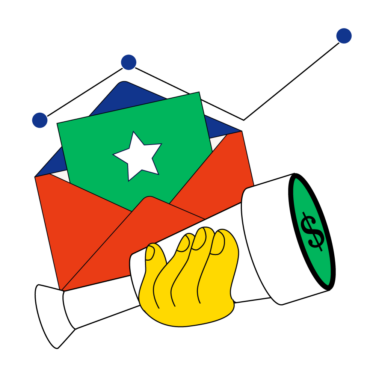Many people are surprised to learn that U.S.-based companies spend more than $70 billion a year on training, and an average of nearly $1,500 a year of that goes to individual salespeople. Unfortunately for sales managers, 80% of sales training topics are forgotten in the first 90 days. That's a titanic waste of effort for sales teams operating on slim margins. You can't stop training your sales reps, and you can't make training less expensive, but what if you could improve how and what you're teaching?
This article is all about using smart sales training topics to make your sales training program more effective. It offers 10 topics you can use that are easy to understand, teach well, and stay fresh in sales reps' minds long enough to actually get used.
Why You Need a Sales Training Program
Some people are born with sales skills. Others have to work at it. No matter what you brought to the table when you got started, think about how much better you got with a little training and experience. That's all training really is: messaging that covers condensed experience from other people presented in a way you'll remember.
Even a natural 9/10 sales rep can maybe make it to 9.5/10 with good training. Better yet, because near-perfect isn't very common, running a solid training program can lift your 4s and 5s into 7-8 territory and keep them there. Speaking of which, while most companies limit their training to onboarding new hires and low performers, your sales training program needs to include everybody, even all-stars. See the last tip for more on that.
Sales Training Ideas
Your sales training course needs to be a few things. First, it should be short because packing in too much information at once tends to wash out the details you want your team members to retain. Sales training should also be interactive, with lots of role-playing and practice scenarios. Finally, it should be fun because people pay way more attention to in-person events when they're emotionally engaged with them.
Below, we've broken down our top sales training topics into three categories: before the sale, during the sale, and closing deals. At each step, remember that this is a guide on how to train sales learners, and the tips are for you, the training session leader. The content of your sales training will be up to you, but hopefully, this will help you structure your lessons for successful sales pros of the future.
Before the Sale Starts: Prep Subjects
The sales process starts with good prep work. This is as much a part of the sales cycle as any other, and in many ways, it's the most critical. In this part of your sales coaching, the focus is on helping your team become sales professionals, emphasis on the "professionals" part.
- Competitor and industry knowledge: It's hard to sell if you don't know what you're selling. Open your new sales rep training with an overview of the industry, your products and your competitors, and encourage the team to learn more on their own.
- First contact planning: Making a good first impression isn't random luck, it's the result of planning and research. Teach your teams how to identify potential customers and approach them in the most productive way. The process leading up to the first handshake is the only part of the cycle sales members are totally in control of, and you can teach them how to do it right.
- Practice practicing the sales pitch: Every sales rep who has ever lived has spent time practicing their sales pitch before making it — in the car, in their office and in the mirror at home. That's what it takes to get the pitch down and natural, and practicing it is a skill like any other. Teach your team how and why to practice their pitches. Set aside time, and let the students practice over and over, if only to feel less awkward.
The Sale Begins: Sales Training Topics for First Contact
After you've covered basic competencies for sales team members, it's time to move on to the sale itself. The middle block of your sales training topics should be about how to manage the ebb and flow of a sale, develop active listening skills and answer common objections. Focus on the process here, rather than the details for any one product line.
- Customer outreach: At some point, the sales rep needs to contact the customer. How they do it will vary with the product, the industry, and your company's resources, but there are a few classics to practice with in this module. Cold calling is a perennial favorite for high-volume sales goals and for follow-up sales calls with prospects. Practice these, plus the knock-on-the-door approach, social selling opportunities, and how to manage common pain points with every approach you're using.
- Qualifying leads: No matter what sales strategy you're teaching your learners, everyone who passes your training needs to know how to sort promising leads from unpromising ones. Set aside time for this with an emphasis on your own experience and how your company wants to sort the leads that haven't made the decision to buy yet.
- Identifying needs and meeting them: This topic is frequently overlooked, but it's not clear why. Every missed sale is, in theory, a sales success you missed for some reason. More often than not, that reason was that the sale didn't meet a need for the person. Create a range of fictional buyer personas for your team to practice on and give them a challenge on spotting the issue that's holding back the "yes" they need.
- What is a value statement?: Finding the value statement in a sales approach is at the core of making a great deal easily. To teach your learners how to find the value statement in any product, give them a range of items, even the chairs they're sitting on, and encourage them to develop the value proposition that will sell that product.
More Articles
Closing the Deal: The ABC's of Always Be Closing
Closing the deal is the punctuation mark at the end of the process, and it's the point your teams will spend their careers driving toward. That's probably why so many existing sales training topics out there revolve around this part of the cycle. It's still worth going over in your class, and fortunately, there's a lot of great printed material out there you can work into training the team for closing.
- Negotiations: Some sales are as-is, no negotiation possible. Others are more flexible on the price and various intangibles. If your sales team has any discretion here at all, it's well worth a full training session to teach them good negotiations. If you're selling cars, for example, one of your reps can be a sub-par negotiator and consistently sell for a 5% margin. A high performer might get 7%. If the average car is priced at $30,000, and the sales rep moves a modest 20 cars a month, the extra 2% they learned to negotiate for nets $12,000 extra a month. Teaching good negotiations is worth all the time and money it takes to do it right.
- Closing the deal training: Eventually, your reps have to close the deal. This is also an art, like so much else in sales, and the training should reflect that. It's probably a good idea to start by allaying new sales reps' fears that they'll make some critical mistake and "blow the sale" at the last minute. Then, with everyone reassured and confident, teach them how to not do that. Your company probably has a preferred closing approach, so teach that, but emphasize confidence, positivity, and a feeling that their hard work up to this point has rightly paid off in a solid close.
- Sales training attitude: There's another factor to your sales training that touches on all of the other topics. That's the attitude you promote toward training itself. One of the most valuable lessons for sales reps to learn is that they should always be learning. Even grizzled veterans who have been selling for decades can usually learn a thing or two from a good teacher, and it never hurts to brush up on some half-forgotten basics. Cultivate a culture of continuous improvement for everyone, and don't be surprised if your sales team teaches you as much as they learn.
Upskill your sales team at industry conferences. Check out the best sales conferences to equip your sales team with the knowledge and skills to succeed.
Always Be Learning
It takes time and effort to put together a good sales training program and even more time to teach yourself how to implement it well. The RevOps newsletter takes less time and effort to read, but you sure do get a lot out of it. Whether you're an old sales pro yourself, or you've just wrapped your new-hire training and are already looking to excel, sign up for the latest on sales, technology, automation and more from our top experts.


